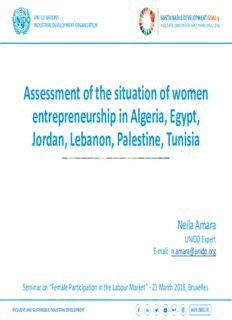
Assessment of the situation of women entrepreneurship in Algeria, Egypt, Jordan, Lebanon PDF
Preview Assessment of the situation of women entrepreneurship in Algeria, Egypt, Jordan, Lebanon
Assessment of the situation of women entrepreneurship in Algeria, Egypt, Jordan, Lebanon, Palestine, Tunisia Neila Amara UNIDO Expert E-mail: [email protected] Seminar on “Female Participation in the Labour Market” - 21 March 2018, Bruxelles MENA CONTEXT W o men participation rate in the labor force 21% (vs 49% worldwide and 51 % in the EU, est. 2017) World’s highest female unemployment rate at 21% (ILO 2017) more than twice the rate for men Lowest Female Established Business Ownership Rate (in % of Female Population Aged 18 to 64) 3% = 1/3 the rate of men (GEM 2015-2016) 2 Background information on the project Phase I labelled by UfM to end in May 2018 Phase II with FAO and UN Women under formulation Social Inclusiveness National Counterparts: Ministries of Industry of the targeted countries and Women Business Associations in Algeria, Egypt, Jordan, Lebanon, Economic Competitiveness Morocco, Palestine and Tunisia. Target Beneficiaries: Women’s Business Associations and women entrepreneurs (and aspiring entrepreneurs), of both urban and rural areas Duration: 36 months (Phase I) + 36 months (Phase II) Project Cost : EUR 1.4M funded by the Italian Government (Phase I). Scope: Enhance women’s economic inclusion and create the conditions for a sustainable and inclusive growth by harnessing the potential of women entrepreneurs. 3 PILLARS OF PHASE I INTERVENTION STRATEGY 4 SURVEY AND LESSONS LEARNED 5 METHODOLOGY OF SURVEY AND DATA ANALYSIS 6 1411 Women entrepreneurs surveyed in 7 MENA countries Egypt Jordan 7 interconnected areas covered - 55 questions: Lebanon 1. Personal and business characteristics 2. Membership in associations and networking Morocco 3. Institutional support and access to credit and financial services Palestine 4. Access to BDS, technology, mentoring, counselling and training Tunisia 5. Optimism and outlook for business growth 6. Perception of the business environment Algeria 7. Perception of social norms and gender gaps (2017) A technical paper on women entrepreneurship in the MENA region published in English, French and Arabic. http://www.unido.org/publications/creating-shared- prosperity/women-and-youth-in-productive-activities.html 7 Profile of surveyed women entrepreneurs Average age 40 A majority is married 2.2 children on average 2 of 3 have a university degree Close to 9 years in business on average 1411 8 WOMEN ENTREPRENEURSHIP SALIENT FEATURES • 1 of 4 women-led Sectoral distribution of women-led businesses in handicraft businesses sector Handicraft 25% Trade 23% • Only 7% of businesses in Service 31% Agriculture and 14% in Manufacturing 14% Agriculture 7% Manufacturing • Majority of small to very Share of female employment small businesses: 70 percent declare less than 10 employees 84% 82% 73% 61% 63% 63% • The share of female 58% employees in women-led 24% 26% 25% 17% 20% 16% 20% businesses is 3.5 times Algeria Egypt Jordan Lebanon Morocco Palestine Tunisia higher than in total Share of female employment in surveyed women-led businesses employment Share of female employment in total employment ( ILO est. 2017) 10
Description: